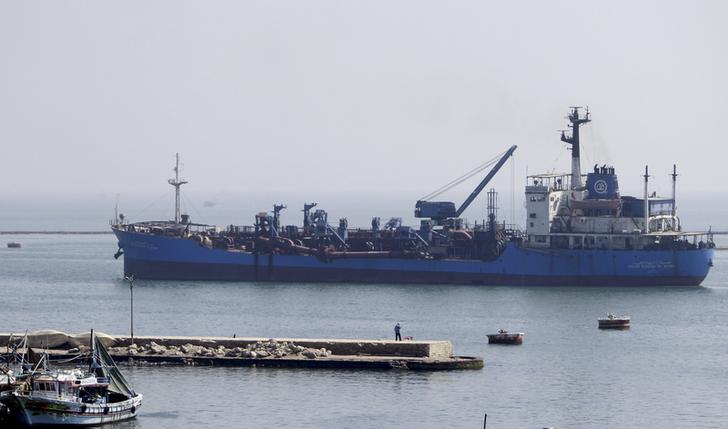Latest NEWS
- Aswat Masriya, the last word
- Roundup of Egypt's press headlines on March 15, 2017
- Roundup of Egypt's press headlines on March 14, 2017
- Former Egyptian President Hosni Mubarak to be released: lawyer
- Roundup of Egypt's press headlines on March 13, 2017
- Egypt's capital set to grow by half a million in 2017
- Egypt's wheat reserves to double with start of harvest -supply min
- Roundup of Egypt's press headlines on March 12, 2017
Egypt plans extra stimulus by year-end, Suez Canal project

A ship passes through the Suez Canal near Port Said, 170 km (106 miles) northeast of Cairo, March 10, 2013. REUTERS/Mohamed Abd El Ghany
By Asma Alsharif and Yasmine Saleh
CAIRO, Nov 11 (Reuters) - The Egyptian government will launch a new economic stimulus package by the end of the year, the finance minister said on Monday, bringing forward spending plans that will help revive the economy but put even more strain on state coffers.
Pointing to efforts to attract new investment, the military-backed government also said it would launch a tender to draw up plans to develop a corridor around the Suez Canal, reviving a mega-project tabled by deposed president Mohamed Mursi.
The government ministers were speaking at a Euromoney conference aimed at boosting confidence in an economy battered by close to three years of political turmoil, dating back to the 2011 uprising against President Hosni Mubarak.
Boosted by financial support from Gulf states hostile to Mursi's Muslim Brotherhood, the government installed in July is pumping billions of dollars into the economy of the Arab world's most populous nation.
Finance Minister Ahmed Galal said the second stimulus package, previously estimated at 24 billion Egyptian pounds ($3.5 billion), would be launched "before January". The government had previously indicated it might only be brought in early next year.
The first stimulus package was initially set at 22.3 billion pounds, but the government announced on Oct. 21 it had increased it to 29.6 billion pounds.
"The second package is a heavy burden on the budget especially since it is not yet clear where the financing will come from," said Moheb Malak, an economist at Prime Holding.
"In terms of growth it is expansionary and a positive thing. However, most of the first package went into consumption," he said, adding that the second package should be directed towards investment in areas such as transport infrastructure.
During Mursi's year in power, Egypt's budget deficit widened to almost 14 percent of gross domestic product (GDP), a number the government, backed by Gulf aid, hopes to reduce to around 10 percent this year.
It also hopes investors and tourists will bring dollars, taking pressure off the Egyptian pound, which has lost almost 16 percent of its value since the uprising and even more on the black market.
FRAGILE ECONOMY
Egypt's finances are in a precarious state with a massive deficit, but the government has rejected the conventional wisdom of International Monetary Fund-prescribed austerity measures.
If the plan fails, a new government expected to be elected early next year could find itself deep in debt, its currency overvalued and an economy in crisis.
In separate comments to financial daily Al-Mal, Galal said the ministry was coordinating with the planning ministry to decide the size of the new spending and the sources of finance "without that causing new strain on the public finances".
Egypt's economy has been crippled by social and political turmoil since Mubarak's downfall in 2011, but has been helped in recent months by funding from several Gulf Arab States that are hostile to the Muslim Brotherhood.
Saudi Arabia, Kuwait and the United Arab Emirates promised a combined $12 billion in loans, grants and fuel shipments after the army, prompted by mass protests, overthrew Mursi on July 3.










